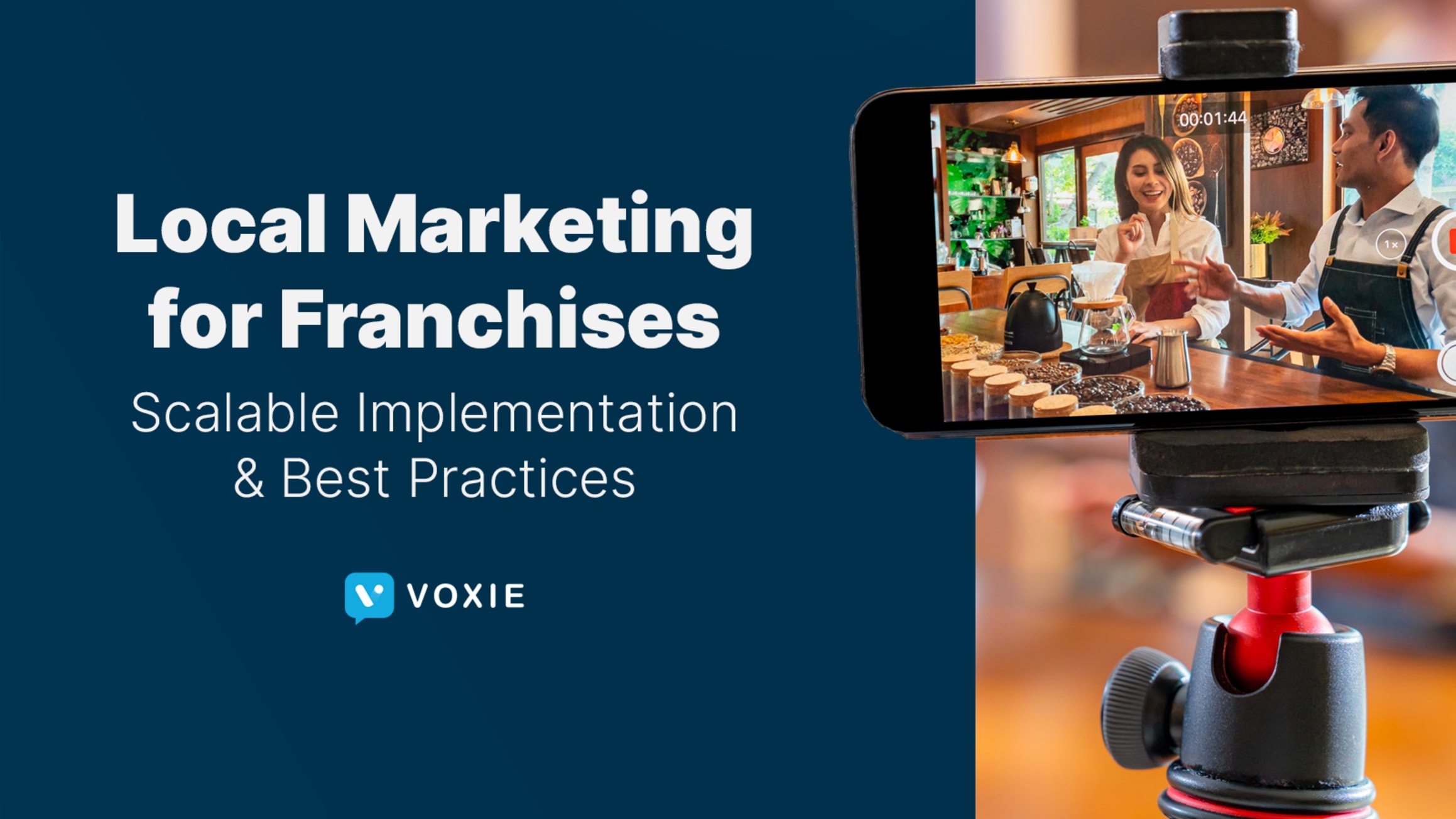Franchisors face a unique challenge in balancing brand consistency with the need for localized marketing.
Localized marketing resonates because it speaks directly to individual needs, and franchisees, with the right tools and training, are best positioned to understand those needs. However, franchisors often hesitate to relinquish full control of local marketing efforts.
The key lies in finding a balance: How can brands maintain oversight and consistency while empowering franchisees to connect authentically with their local markets? This article explores strategies for achieving that balance, ensuring brand integrity without stifling local initiative.
Who Should Own Local Marketing—Franchisees or the Franchisor?
The question of who should own local marketing in a franchise system—the franchisees or the franchisor—doesn’t have a single, universally correct answer. Nor is it a simple either/or choice. Instead, the most effective approach involves a division of responsibilities.
Our recommendation: franchisors should own the overall marketing assets and strategy, while franchisees should be empowered to handle the execution at the local level. This model allows for brand consistency and strategic alignment, while also leveraging the local market expertise of individual franchisees.
Luckily, there are franchise-friendly marketing platforms that allow administrators to allocate varying levels of access, as is the case for all of the software listed on Top Marketing Tools for Franchises - Propel Growth & Efficiency. This gives franchisees some independence while enabling the franchisor to set firm parameters within which the franchisees operate.
For example, consider a platform like Voxie. It can be configured to allow franchisors to craft SMS templates, view real customer exchanges, create sophisticated drip campaigns, analyze performance data across the entire ecosystem, and ultimately retain control over the brand messaging and customer experience. However, franchisees can be granted access to leverage existing templates or potentially craft their own (subject to franchisor approval); create their own subscriber lists within defined parameters; and review their own performance data.
This type of setup helps establish firm marketing creative and messaging boundaries, which would be difficult for franchisees to violate, while simultaneously granting them some autonomy and the ability to tailor their efforts to their specific local market.
More importantly, this grants the franchisor ultimate ownership of critical marketing assets. If a franchisee leaves on bad terms, they can’t deprive the parent organization of valuable local marketing historic data or, crucially, their SMS subscriber lists. This protects the brand and ensures continuity in the long run.
How to Safeguard Your Brand Without Micromanaging Local Marketing
Create a Comprehensive Repository of Marketing Materials Easy to Localize
Franchisees will be much less likely to stray far from your brand guidelines if they’re given a wealth of marketing assets they can localize and leverage, including:
- Web pages templates
- Social posts
- Email templates
- SMS communications
- MMS materials like images or GIFs
- Branded print materials
- Digital ads and banners
- Pre-approved photos and visuals
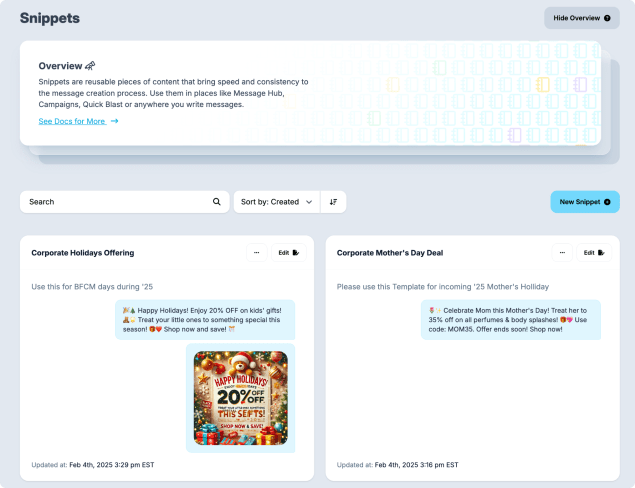
Let Franchisees Play Creatively Within Well-Defined Parameters
Localized marketing thrives on embracing the unique character of each franchisee’s location. To that end, empower franchisees to shape their local marketing efforts, while providing clear guidelines on what is considered off-brand. Opportunities for franchisee input can include:
- Colors or design elements that deviate from brand standards
- Approved and unapproved imagery, such as photos or graphics
- Logo usage guidelines, including prohibited modifications
- Tone and voice rules for written and spoken content
- Restricted promotional themes or messaging (e.g., political, religious)
- Limitations on using third-party branding or partnerships
- Font styles or typography not aligned with the brand
- Social media hashtags or tags that conflict with brand identity
- Unauthorized adaptations of taglines or slogans
- Rules for altering branded templates or materials
- Compliance requirements for legal disclaimers or trademarks
- Restrictions on using competitor comparisons in marketing
- Clear boundaries for discounting or pricing language
- Guidelines for community partnerships or sponsorships
- Policies on integrating local slang or cultural references
- Prohibited types of advertising (e.g., guerilla marketing, unsolicited emails)
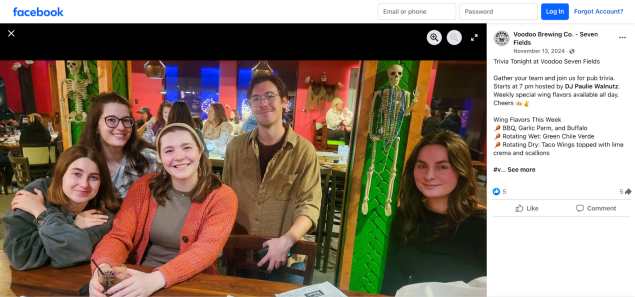
Encourage Healthy Two-Way Communication
Deviation from a franchise’s local marketing strategy happens either accidentally or purposefully—both of which can be remedied through improved communication.
To avoid accidental deviation, ensure onboarding and contracts are comprehensive and up-to-date. Clear documentation prevents misunderstandings and sets expectations from the outset. Franchisees should also be granted thorough training sessions for any marketing tools they are expected to use.
To avoid purposeful deviation, create a culture of open communication where franchisees feel comfortable contributing their own local marketing ideas and airing any grievances. Actively solicit feedback and consider implementing successful local strategies across the franchise system. Addressing concerns promptly and demonstrating a willingness to adapt based on franchisee input fosters trust and reduces the likelihood of intentional deviations.
Ask the Right Questions When Vetting Franchisee Candidates
Vetting franchisee candidates should always include thorough background checks and comprehensive reviews of their financial stability. However, don’t overlook the crucial Q&A portion of the evaluation, as this is where you can truly determine if they’re the right fit for your franchise system. Asking targeted questions about their approach to marketing is particularly important. Here are some marketing-related questions to consider incorporating into your vetting process:
- What are your long-term goals as a franchise owner?
- What do you know about our brand and its values?
- How do you plan to represent our brand in your market?
- What can you tell us about the local market and competition?
- How will you attract and retain customers in this area?
- Are you willing to follow our established systems and processes?
- How do you feel about adhering to strict brand guidelines?
- How do you handle feedback or guidance from others?
- How do you see your franchise location growing in the next 3-5 years?
- Do you have any questions or concerns about the franchise agreement?
The ideal franchisee candidate will be open to collaborating on local marketing execution, providing innovative ideas and valuable insights into their market while ultimately understanding and adhering to the established brand guidelines.
The wrong franchisee will do one of two things: either perform the bare minimum when executing local marketing strategies, showing a lack of initiative, or ignore brand stipulations entirely.
Always Confirm the Parent Franchise Has Control Over Digital Profiles and Assets
It’s crucial that the parent company ultimately has ownership and administrative control over all digital marketing properties associated with each individual franchise location, such as Google Business Profile (formerly Google My Business) and Facebook pages. Why?
- Grants greater visibility into performance data - Centralized control allows the franchisor to monitor the performance of local marketing efforts across the entire franchise system, identifying trends, best practices, and areas for improvement.
- Prevents disgruntled franchisees from going rogue - In the event of a dispute or termination, ownership prevents a disgruntled franchisee from publishing disparaging content on the location’s digital profiles, protecting the brand’s reputation.
- Prevents access from being blocked - Similarly, ownership ensures that a departing franchisee cannot block the parent company’s access to these critical profiles, ensuring a smooth transition.
- Ensures full lifecycle management - The franchise organization maintains the ability to reinforce brand standards and messaging, from the initial launch of the pages to their eventual shutdown, maintaining control throughout the entire lifecycle.
Equip Franchisees with the Knowledge and Tools to Market Right
While comprehensive brand guidelines are essential, they shouldn’t be the only marketing training franchisees receive. Ongoing education and support are crucial for empowering franchisees to effectively market their local businesses.
- Perfect your onboarding process - Streamline your onboarding process to ensure franchisees can hit the ground running with a solid understanding of marketing best practices and available resources.
- Provide continuous, diversified training - Supplement initial training with ongoing, hands-on support. Diversify training materials and educational opportunities to accommodate different learning styles, including workshops, online courses, and one-on-one coaching.
- Foster peer-to-peer learning - Establish mentorship programs and networking opportunities to help franchisees learn from each other’s experiences and share successful franchise local marketing strategies.
- Stay current with industry trends - Regularly release new training modules and webinars to help franchisees stay up-to-date with the latest local marketing strategies, tools, and technologies.
- Solicit and act on franchisee feedback - Collect regular feedback from franchisees regarding the effectiveness of your existing local marketing training materials. This feedback can help you identify areas for improvement and tailor future training to address the topics that are most relevant and interesting to your franchisees.
Galvanize Your Franchise’s Local Marketing With These Tactics
Identify Your Target Audiences at the Local Level
Congratulations, you’ve successfully grown your franchise network across diverse localities. Now comes the challenge of understanding precisely who your customers are from one franchisee location to the next.
Even a seemingly small distance of just 10 miles can make a world of difference in terms of your core audience demographics and preferences. Therefore, a one-size-fits-all marketing approach is unlikely to be effective.
To effectively target local customers:
- Partner with your franchisees - Collaborate closely with your franchisees to gain a deeper understanding of their specific core audiences and their unique needs and desires.
- Observe customer buying patterns - Analyze customer behavior, paying close attention to when and what they are buying. For example, a bakery located near a subway station may primarily cater to commuters seeking a quick bite on-the-go, while a bakery nestled in a suburban neighborhood may generate most of its revenue through larger orders for events.
- Tailor messaging and promotions - Use these insights to shape both the messaging and promotional offers that your franchisees deploy. A commuter-focused bakery might emphasize speed and convenience, while a suburban bakery might focus on quality ingredients and special occasion offerings.
- Review local demographic data - Utilize readily available local demographic data to gain a broader understanding of the population in each franchisee’s territory.
- Conduct social listening - Monitor social media channels for conversations related to your brand and your competitors in each local market.
- Analyze audience response - Meticulously document and analyze how localized audiences respond to your franchisees’ marketing materials. Pay close attention to the specific media channels and messaging that generate the most engagement.
Make Sure Your Franchisee’s Local SEO is Airtight
Local SEO is the process of optimizing a franchisee’s online presence to improve visibility in location-based search results, helping nearby customers easily find their business. A strong local SEO strategy is crucial for driving foot traffic and generating local leads.
A major component of local SEO is the optimization of web pages. Each franchise location should have its own dedicated web page, ideally featuring unique, locally relevant content and properly implemented Schema markup to help search engines understand the specific location and services offered.
Off-site references are another critical contributor to local SEO success, including:
- Google Business Profile (formerly Google My Business)
- Bing Places for Business
- Social media platforms (Facebook, Instagram, etc.)
- Online listing sites and directories (Yelp, Yellow Pages, etc.)
- Review sites (Google Reviews, Yelp, etc.)
To maximize local SEO impact:
- Ensure that all online profiles are complete, accurate, and consistent across all platforms.
- Use localized keywords and terms throughout the profiles and website content.
- When applicable, actively encourage satisfied customers to leave positive reviews on platforms like Google Business Profile and Yelp, as positive reviews significantly strengthen local SEO rankings.
Segment Your Franchise’s Subscriber’s List by Region or Location
In a franchise system, email and SMS messages may originate from various sources, including individual franchisees, regional management, or the parent brand itself. To ensure effective communication and targeted marketing, it’s crucial to segment your subscriber lists.
While maintaining a unified subscriber list across the entire franchise system is beneficial for overall brand communication, it’s optimal to segment that list by location (among other relevant qualifiers like demographics or purchase history).
This segmentation allows your franchise brand to send the right localized messages to the right people without necessarily depending on individual franchisees to orchestrate every outreach campaign. Targeted messaging increases engagement and relevance, ultimately driving better results.
For example:
- Did the Miami Dolphins make it to the playoffs? Your brand can send a congratulatory text message (including a QR code for 15% off buffalo wings) to all subscribers located in the Miami area.
- Offer 20% off lunchtime salad bowls to all subscribers who primarily visit franchise locations in metropolitan downtown areas, targeting office workers during their lunch break.
Localize the Franchise’s Social Marketing
Craft the social messaging to directly speak to the community
For an example of a franchise emphasizing their communal ties, this Instagram account for a Biggby Coffee franchise places a large spotlight on the individual staff members. While it may be part of a multi-million dollar company, the localized focus gives the franchise location the positive feel of a small business.
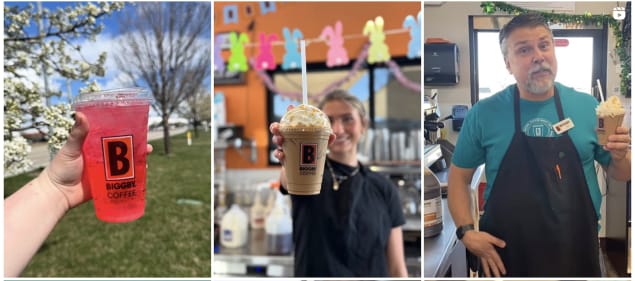
Another example of this marketing principle in action? Camp Bow Wow uses franchise-specific Instagram accounts to highlight the dogs that frequently use their services. This not only lends authenticity to their brand but helps nurture relationships with local clientele (who doesn’t like having their pooch be a star?).

Partner with local social influencers
Localized micro-influencers may lack national reach, but they cultivate strong community followings. Partnering with them can be an affordable and effective way to build regional credibility and boost awareness among your franchisees’ target audiences.

Consider collaborating with local organizations
Encourage franchisees to further build out their local presence and strengthen community ties through strategic outreach and collaboration with local organizations and influencers. This proactive approach can significantly boost brand awareness and generate goodwill within the community. Potential avenues include:
- Local news and journalists - Build relationships with local news outlets and journalists to secure media coverage for franchise events, promotions, or community involvement initiatives.

- Partnerships with fellow local businesses - Collaborate with complementary local businesses on cross-promotional campaigns or joint events to reach a wider audience and create mutually beneficial relationships.
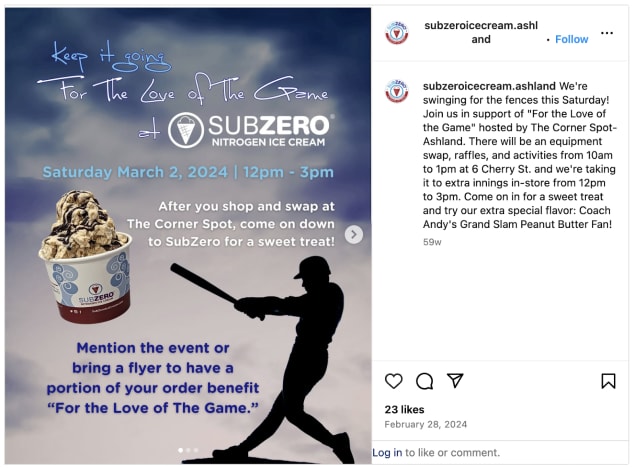
- Contributing toward nonprofit events - Support local nonprofit organizations through sponsorships, donations, or volunteer efforts. This demonstrates a commitment to the community and enhances the franchise’s reputation.
Additional Franchise Marketing Tips from Voxie
While other SMS platforms exist, Voxie stands out as uniquely designed to meet the specific needs of franchisors by providing centralized control and oversight while empowering franchisees with local execution capabilities. Its features, such as templated messaging, performance tracking across locations, and subscriber list management, give franchisors a level of control unmatched by other platforms. This ensures brand consistency and data ownership while enabling franchisees to connect with their local audiences effectively.
Our team has created additional resources to help franchisors break new ground with tactical marketing campaigns. To learn more, read:

About the Author
Ali Spiric
Growth Marketing Manager at Voxie
